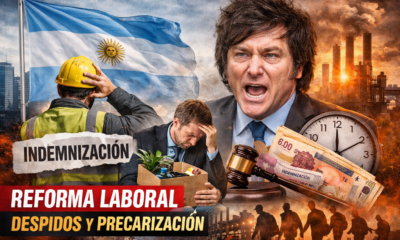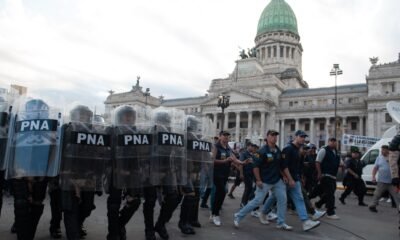INTERNACIONAL
Reporter’s Notebook: The Who . . . not too old to rock

Who’s too old to play rock and roll? Apparently, not The Who if this past week’s concert at London’s Royal Albert Hall is anything to go by. It featured the two core members of the group, 81-year-old lead singer Roger Daltrey and soon-to-be-80-year-old songwriter and lead guitarist Pete Townshend.
Unlike other «senior» musicians and groups like Bob Dylan and the Rolling Stones, who have well-oiled touring machines around them, this was more of a one-off (well, two-off, there had been another concert a few days before) for the respected UK charity Teenage Cancer Trust.
And so it had more than its share of «bumps,» which only made the moments of rock and roll heaven that much more enjoyable.
Guess what? These guys can still rock, sixty years after their first top-ten hit, if a bit tempered by age.
REPORTER’S NOTEBOOK: BRUCE VS BILLY ON NEUTRAL LONDON TURF
Roger Daltrey of The Who performs during the Teenage Cancer Trust benefit concert at the Royal Albert Hall in London, Sunday, March 30, 2025. (James Manning/PA Images via Getty Images)
Daltrey had a few of his memorable hand-mic air throws. OK, instead of hurling the microphone in the air vertically for thirty feet, they were more sideways for ten.
And Townshend, yes, did his windmill guitar stroke movements. I did count eight in a row at one time, but for the most part it was more like one or two at a time.
Nothing was tempered about Daltrey’s voice, despite problems and surgery in the past. It still sailed over the rafters on a range of songs. The high notes of the tune «Love Reign O’er Me» were done with blockbuster bombast.
And Townshend’s guitar licks could stand up to Clapton’s any day. (The latter also just turned 80, by the way.) Unique, stylish, no flubs.
The Who (with a good backing band) played a few of their very early stand-outs. Especially ironic: «My Generation.» (Key line: «I hope I die before I get old.» Well . . . maybe not.)
The rock opera about the deaf, dumb and blind pinball wizard, Tommy, got a bit of a gloss-over, perhaps because of Daltrey’s recent admission that his vision is beginning to go (along with his hearing).
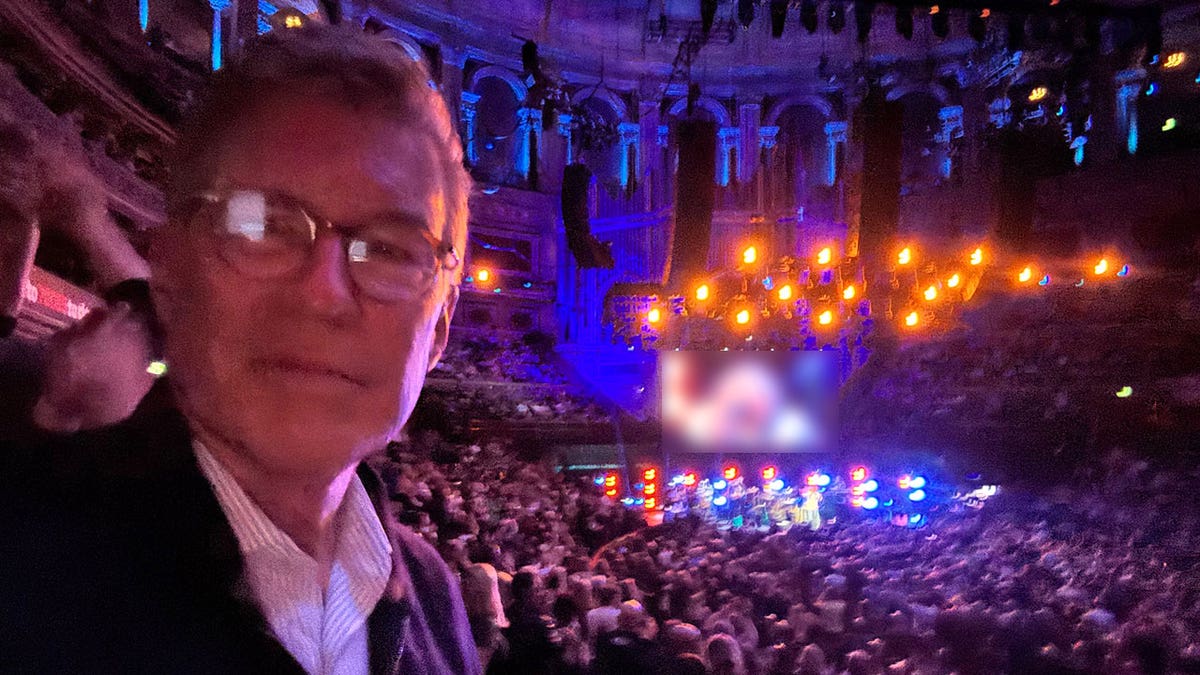
Fox News Correspondent Greg Palkot at The Who’s concert in London. (Greg Palkot/Fox News)
The follow-up, urban rock opera Quadrophenia, was treated with a deeper dive, maybe plugging the ballet version running in London later this year. It never ends.
But what many consider their finest album, Who’s Next, got the full treatment. From «Bargain» to «Baba O’Reilly,» from «Behind Blue Eyes» to «Won’t Get Fooled Again.»
The synthesizer parts might have been pre-recorded . . . but the forceful Daltrey-Townshend duet on the key «Blue Eyes» line was utterly telling:
«And if I swallow anything evil, put your finger down my throat. And if I shiver, please give me a blanket. Keep me warm, let me wear your coat.»
GUNS N’ ROSES’ DRUMMER FRANK FERRER LEAVES BAND AFTER 19 YEARS, NEW MEMBER JOINS TOUR
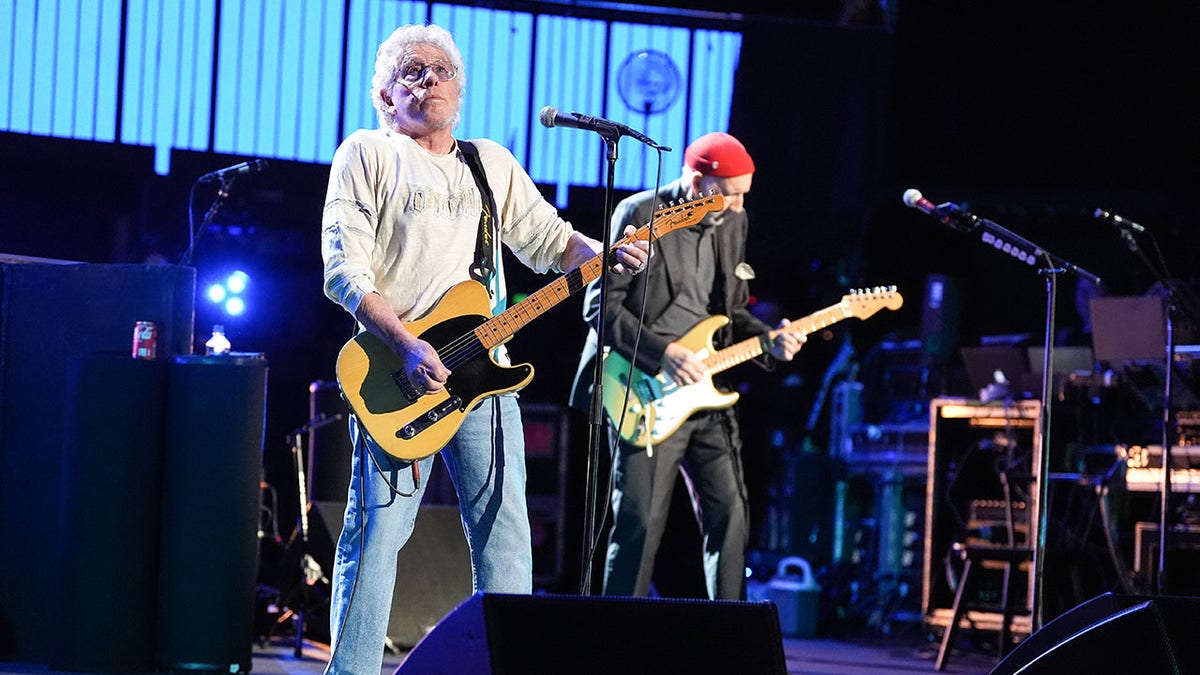
Pete Townshend and Roger Daltrey of the rock band The Who perform on stage during the Teenage Cancer Trust benefit concert at the Royal Albert Hall, London, Thursday, March 27, 2025. (Ian West/PA Images via Getty Images)
So . . . the «bumps» noted earlier: Townshend acknowledged that he had had knee-replacement surgery a month ago. Aside from a few whinges («I’m in agony,’ «I can’t breathe»), he seemed to take it in his stride. Actually, he took it sitting down through half the songs. (No Woodstock-style jumping scissor kicks for him.) But he admitted that it helped him play better.
And Daltrey’s earpiece (which, despite that spotty hearing, helps him stay «in tune») was acting up throughout the night. At one point, he stopped the entire band. «I’m not hearing the Who,» he said good-naturedly, «it sounds like I’m hearing the Troggs,» referring to an old ’60s British pop band. Townshend said in an aside » . . . it was going so well.»
In fact, the two of them, known to have had their ups and downs over the years professionally, often resembled on stage an odd couple, snapping at each other from time to time but also warm to each other . . . and the audience.
Townshend (not necessarily known for his bedside manner) at one point thanking the 5,000-plus Royal Albert Hall crowd for sticking with them all these years, and calling The Who «geriatrics who pretend to be young.»
The demographics of the crowd, I must admit, were somewhat on the senior side. But enough sons and daughters were present and getting into it to give one hope, if not for the future, then at least for the present.
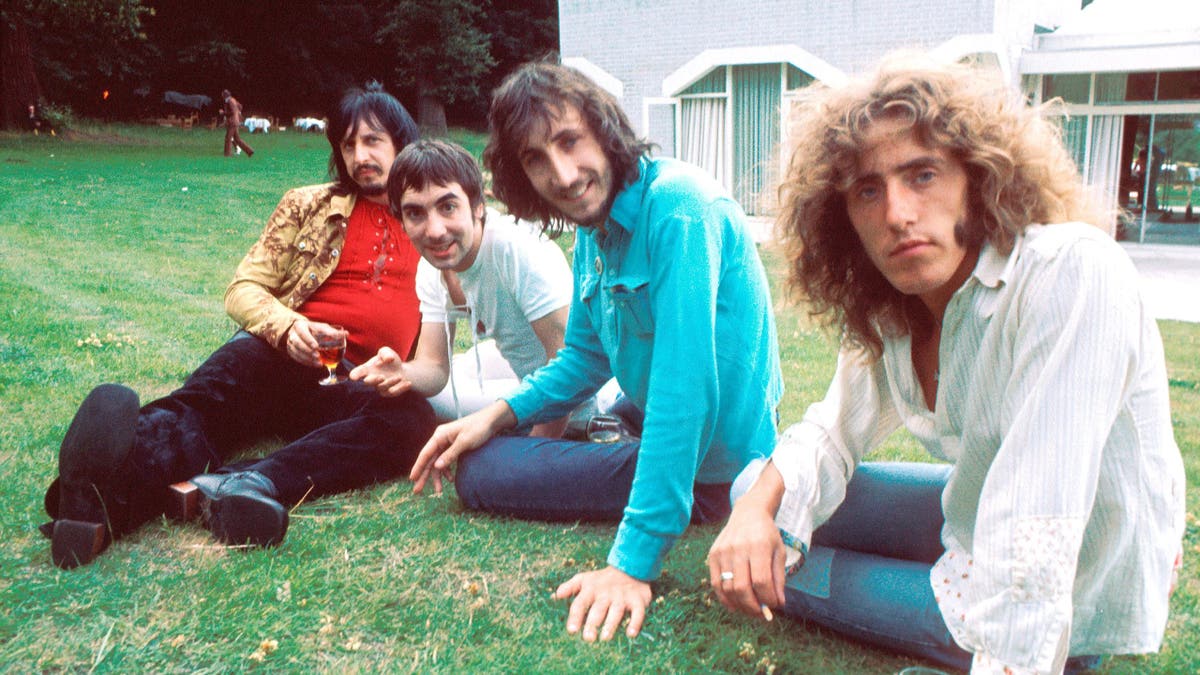
The Who pose for a press call, July 1971, Surrey, United Kingdom: John Entwistle, Keith Moon, Pete Townshend, Roger Daltrey. (Michael Putland/Getty Images)
For we indeed are seeing, sad to say, the tail end performances of the second great generation of rock and rollers. After Chuck, Little Richard and Elvis, came The Beatles, The Stones, Dylan . . . and, yes, The Who.
That’s why it’s more than just fun; it’s an honor to catch these final farewells.
Along with their punchier later hits like You Better You Bet and Who are You, The Who played a song Townshend said they’d never played in concert before. Incredible, as it was recorded 54 years ago. Amid high critical acclaim.
Called «The Song is Over» (also from the Who’s Next album), it was nothing less than extraordinary. And appropriate.
CLICK HERE TO GET THE FOX NEWS APP
As Townshend worked through the riffs and lines. And Daltrey was literally completely slumped over and supported by the standing mic, as if he could go no further, it ended with them singing:
«The song is over, the song is over. Excepting one note, pure and easy, playing so free, like a breath rippling by.»
Except, I take exception. The song, hopefully, is not «over» . . . yet.
INTERNACIONAL
Caso Andrés: la policía peina cada rincón de su antigua mansión tras el operativo supersecreto para detenerlo
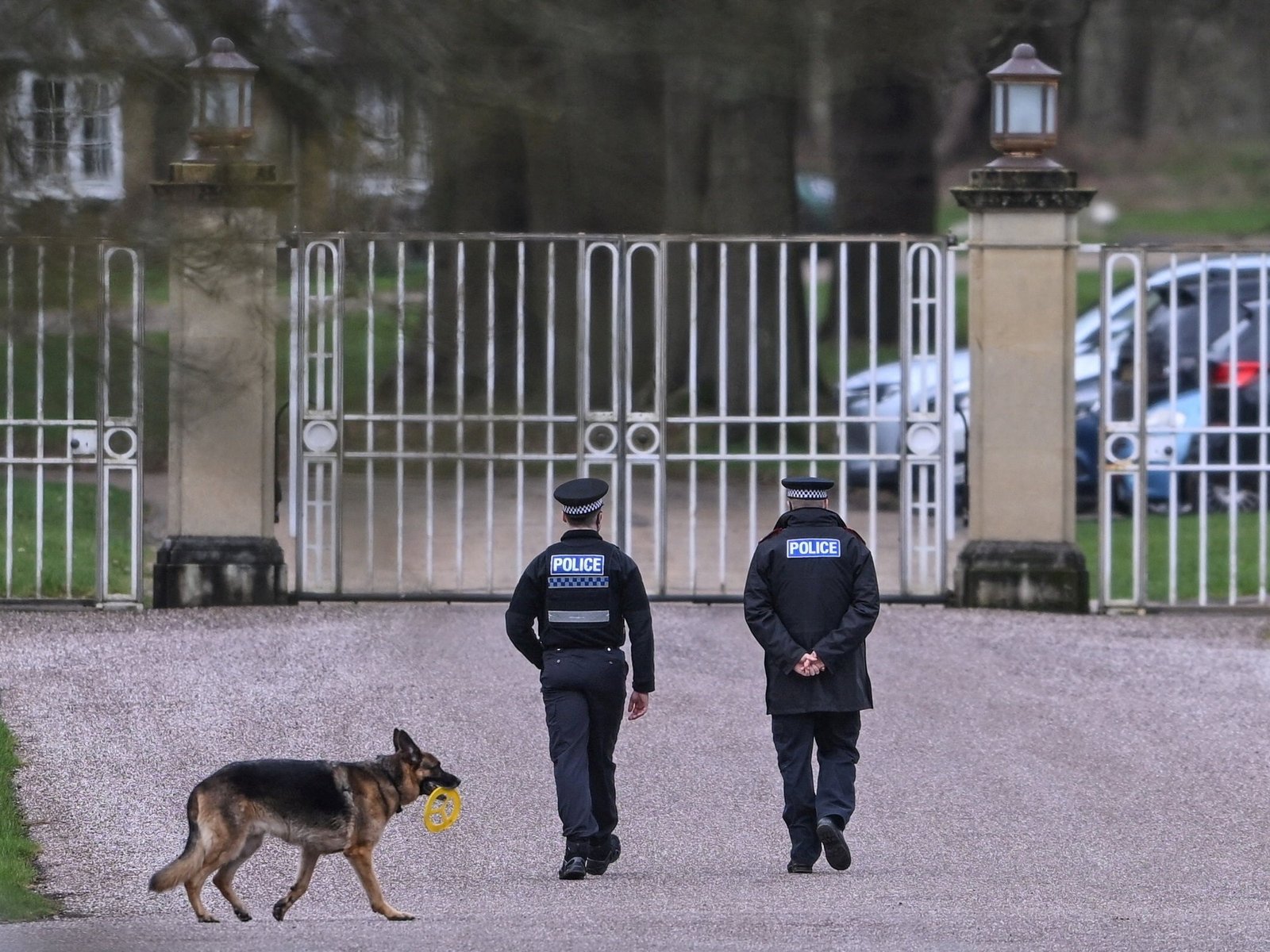
Una operación secreta
Un convoy discreto hasta Sandringham
Como un sospechoso ordinario
Huellas dactilares y foto
INTERNACIONAL
What America’s most powerful warship brings to the Middle East as Iran tensions surge

NEWYou can now listen to Fox News articles!
The Pentagon is deploying the USS Gerald R. Ford to the Middle East, creating a rare two-carrier presence in the region as tensions with Iran rise and questions swirl about possible U.S. military action.
The Ford will reinforce the USS Abraham Lincoln already operating in theater, significantly expanding American airpower at a moment of heightened regional uncertainty.
While officials have not announced imminent action, the dual-carrier presence increases the Pentagon’s flexibility — from deterrence patrols to sustained strike operations — should diplomacy falter.
The largest aircraft carrier in the world
The Gerald R. Ford is the largest and most advanced aircraft carrier ever built.
Commissioned in 2017, the nuclear-powered warship stretches more than 1,100 feet and displaces more than 100,000 tons of water. It serves as a floating air base that can operate in international waters without relying on host-nation approval — a key advantage in politically sensitive theaters.
Powered by two nuclear reactors, the ship has virtually unlimited range and endurance and is designed to serve for decades as the backbone of U.S. naval power projection.
The world’s largest aircraft carrier, USS Gerald R. Ford, steams alongside the replenishment oiler Laramie. (U.S. Naval Forces Central Command / U.S. 6th Fleet / Handout via Reuters)
WORLD’S LARGEST AIRCRAFT CARRIER HEADS TO MIDDLE EAST AS IRAN NUCLEAR TENSIONS SPIKE DRAMATICALLY
How much airpower does it carry?
A typical air wing aboard the Ford includes roughly 75 aircraft, though the exact mix depends on mission requirements.
Those aircraft can include F/A-18 Super Hornets, stealth F-35C Joint Strike Fighters, EA-18G Growler electronic warfare jets, E-2D Hawkeye early warning aircraft and MH-60 helicopters.
In a potential conflict with Iran, several of those platforms would be central.
The F-35C is designed to penetrate contested airspace and carry out precision strikes against heavily defended targets. The Growler specializes in jamming enemy radar and communications — a critical capability against Iran’s layered air defense systems.
The E-2D extends surveillance hundreds of miles, helping coordinate air and missile defense.
Together, they give commanders options ranging from deterrence patrols to sustained strike operations.

An F-18E fighter jet takes off from the aircraft carrier USS Gerald R. Ford as it sails during NATO Neptune Strike 2025 exercise on Sept. 24, 2025, in the North Sea. (Jonathan Klein/AFP via Getty Images)
Built for higher combat tempo
What separates the Ford from earlier carriers is its ability to generate more sorties over time.
Instead of traditional steam catapults, it uses an electromagnetic aircraft launch system, or EMALS, allowing aircraft to launch more smoothly and at a faster pace. The system is designed to reduce stress on jets and increase operational tempo.
The ship also features advanced arresting gear and a redesigned flight deck that allows more aircraft to be staged and cycled efficiently.
In a high-intensity scenario — particularly one involving missile launches or rapid escalation — the ability to launch and recover aircraft quickly can be decisive.
How it compares to the Lincoln
While both the Ford and the Abraham Lincoln are 100,000-ton, nuclear-powered supercarriers capable of carrying roughly 60 aircraft to 75 aircraft, they represent different generations of naval design.
The Lincoln is a Nimitz-class carrier commissioned in 1989 and part of a fleet that has supported decades of operations in the Middle East. The Ford is the Navy’s next-generation carrier and the lead ship of its class.
The key difference is efficiency and output.
The Ford was built to generate a higher sustained sortie rate using its electromagnetic launch system, along with a redesigned flight deck and upgraded power systems. In practical terms, both ships bring substantial strike capability — but the Ford is designed to launch and recover aircraft faster over extended operations, giving commanders greater flexibility if tensions escalate.

USS Gerald R. Ford pictured in the Mediterranean Sea. (U.S Naval Forces Central Command / U.S. 6th Fleet / Handout via Reuters)
IRAN SIGNALS NUCLEAR PROGRESS IN GENEVA AS TRUMP CALLS FOR FULL DISMANTLEMENT
How it defends itself
The Ford does not sail alone. It operates as the centerpiece of a carrier strike group that typically includes guided-missile destroyers, cruisers and attack submarines.
Those escort ships provide layered air and missile defense, anti-submarine protection and additional strike capability.
The carrier itself carries defensive systems including Evolved Sea Sparrow Missiles, Rolling Airframe Missiles and the Phalanx Close-In Weapon System — designed to intercept incoming threats at close range.
That defensive posture is especially relevant in the Middle East.
Iran has invested heavily in anti-ship ballistic missiles, cruise missiles, armed drones, naval mines and fast-attack craft operated by the Islamic Revolutionary Guard Corps. The Gulf region presents a dense and complex threat environment, even for advanced U.S. warships.

The world’s largest warship, U.S. aircraft carrier USS Gerald R. Ford, on its way out of the Oslofjord at Nesodden and Bygdoy, Norway, Sept. 17, 2025. (NTB/Lise Aserud via Reuters)
Why two carriers matter
With both the Ford and the Lincoln in theater, commanders gain more than just added firepower. Two carriers allow the U.S. to sustain a higher tempo of operations, distribute aircraft across multiple areas, or maintain continuous presence if one ship needs to reposition or resupply.
Dual-carrier deployments are relatively uncommon and typically coincide with periods of heightened regional tension.
CLICK HERE TO DOWNLOAD THE FOX NEWS APP
The timing — as negotiations with Tehran continue — underscores the strategic message. Carriers are often deployed not only to fight wars, but to prevent them.
By positioning both ships in the region, Washington is signaling that if diplomacy falters, military options will already be in place.
conflicts defense,us navy,iran,middle east,pentagon
INTERNACIONAL
Trump dijo que desclasificará la información secreta del Gobierno de EE.UU. sobre «los extraterrestres y ovnis»
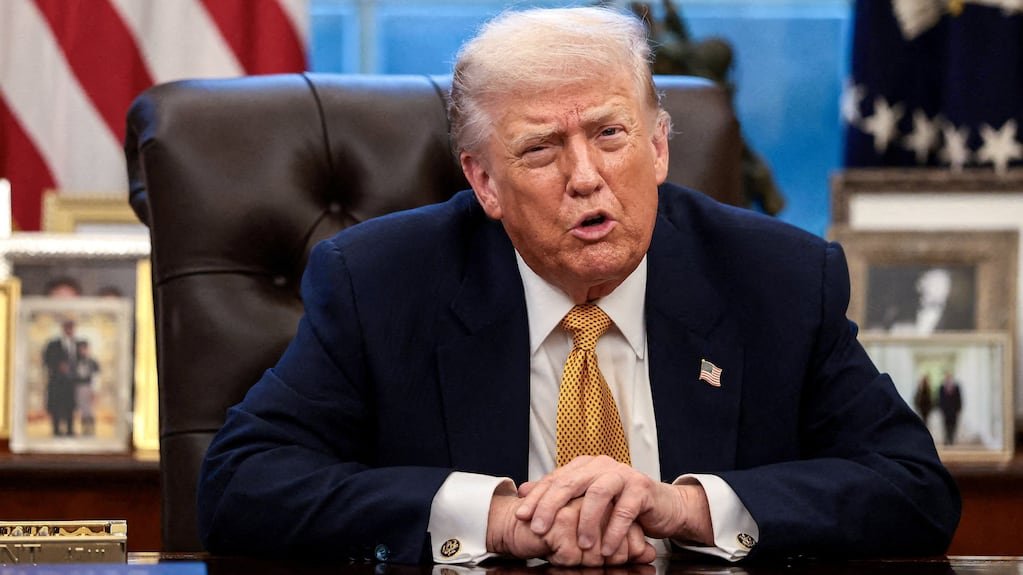
Donald Trump anunció que ordenará a las agencias federales de Estados Unidos publicar documentos clasificados sobre “vida extraterrestre” y “ovnis”.
El presidente eligió su red social, Truth, para lanzar la promesa y aseguró que el proceso incluirá archivos sobre fenómenos aéreos no identificados (UAP) y objetos voladores no identificados (UFOs), además de cualquier otra información relevante.
Leé también: Trump aseguró que Obama reveló información clasificada cuando habló de la existencia de extraterrestres
“En vista del gran interés mostrado, ordenaré al secretario de Defensa, Pete Hegseth, y a otros departamentos y agencias relevantes que inicien el proceso de identificación y publicación de archivos gubernamentales relacionados con vida extraterrestre, fenómenos aéreos no identificados y objetos voladores no identificados, así como cualquier otra información relacionada con estos asuntos altamente complejos, pero extremadamente interesantes e importantes”, escribió Trump en su mensaje.
Cruce con Obama y acusaciones de información clasificada
Horas antes, Trump apuntó contra Barack Obama y lo acusó de revelar información clasificada sobre alienígenas durante una entrevista en un popular podcast. “Son reales, pero no los he visto y no los tienen guardados en… el Área 51”, le dijo al presentador Brian Tyler Cohen al referirse a esa instalación secreta y que es centro de muchas teorías conspirativas sobre los ovnis.
El expresidente demócrata Barack Obama causó revuelo al decir en un podcast que los extraterrestres «son reales». (Foto: EFE/EPA/Micheal Reynolds)
“No hay una instalación subterránea. A menos que exista una conspiración enorme y se lo hayan ocultado al presidente de Estados Unidos”, agregó.
Las declaraciones de Obama generaron revuelo en redes sociales y alimentaron la expectativa de quienes creen en la existencia de vida fuera de la Tierra.
El exmandatario demócrata intentó bajar el tono y, en un comunicado, sostuvo: “El universo es tan vasto que hay muchas probabilidades de que contenga otras formas de vida. Pero las distancias entre los sistemas solares son tan grandes que la probabilidad de que hayamos sido visitados por extraterrestres es baja, y durante mi presidencia no vi ninguna evidencia de que extraterrestres hayan contactado con nosotros. ¡De verdad!”.
Al ser consultado por periodistas a bordo del Air Force One, Trump insistió en que Obama “proporcionó información clasificada; y se supone que no debe hacerlo”.
Sin embargo, evitó responder si eso significa que los alienígenas existen y deslizó que podría “sacar de apuros” a su antecesor desclasificando los archivos, aunque no dio detalles sobre cómo ni cuándo lo haría.
Una promesa en medio de sospechas y cortinas de humo
Como suele ocurrir con Trump, no está claro si cumplirá con su promesa ni de qué manera piensa hacerlo. Tampoco se sabe cuánto de “cortina de humo” hay en el anuncio, justo cuando otros temas sensibles, como el caso Epstein, dominan la agenda mediática en Estados Unidos.
Lo cierto es que el interés por los ovnis y la vida extraterrestre creció en los últimos años. Según una encuesta de YouGov de noviembre pasado, el 56% de los estadounidenses cree que “los alienígenas visitaron la Tierra”.
El Congreso y los testimonios sobre ovnis
El tema no es nuevo en la política estadounidense. El Congreso realizó varias audiencias sobre ovnis, y en el verano de 2023 escuchó a testigos clave como David Fravor (comandante retirado de la Marina), Ryan Graves (expiloto de la Armada) y David Grusch (exoficial de inteligencia de la Fuerza Aérea), quien afirmó que el Pentágono tiene partes de naves alienígenas y “restos no humanos”.
Leé también: Así cayó el príncipe Andrés: su vínculo con Epstein, títulos reales perdidos y un arresto histórico
El objetivo de esas audiencias fue presionar al Pentágono para que difunda información clasificada, bajo el argumento de que se trata de una cuestión de seguridad nacional.
Algunos legisladores, como Tim Burchett (Tennessee), insisten en que los UAP pueden ser naves extraterrestres, pero también globos espía, artefactos de potencias rivales como China y Rusia, chatarra aeroespacial, satélites de Elon Musk o simples ilusiones ópticas.
Una fascinación que viene de lejos
La obsesión de Estados Unidos por los ovnis se remonta a 1947, cuando el piloto Kenneth Arnold describió una cadena de objetos brillantes sobre el Monte Rainier, en Seattle, y popularizó el término “platillo volador”, según re4cordó el diario El País.
En 2017, un artículo de The New York Times reveló la existencia de un programa secreto del Pentágono que desde 2007 estudia los avistamientos militares de UAP. Tras esa publicación, el Departamento de Defensa decidió en 2020 divulgar videos de encuentros de pilotos militares con objetos voladores no identificados, que ya circulaban por internet.
Donald Trump, ovnis, extraterrestres, Barack Obama

 POLITICA3 días ago
POLITICA3 días agoReforma laboral bomba: menos indemnización, más horas y despidos más fáciles — el cambio que puede sacudir el empleo en Argentina

 ECONOMIA2 días ago
ECONOMIA2 días agoAyuda Escolar Anual: a cuánto asciende, donde se tramita y quien puede cobrarla

 POLITICA3 días ago
POLITICA3 días agoEl Gobierno endurece las medidas de seguridad y control en la marcha prevista contra la reforma laboral en el Congreso












